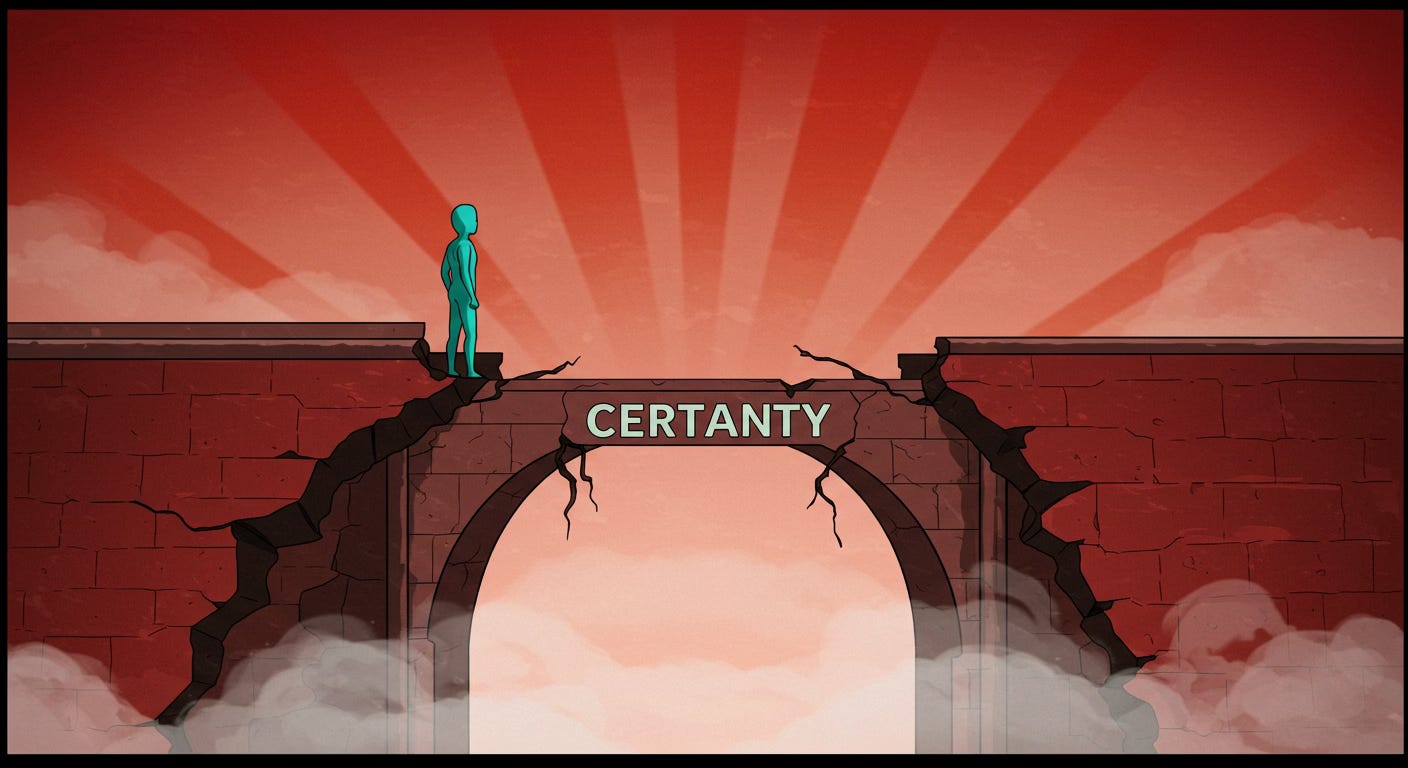We live in a world that rewards certainty. The confident expert, the decisive leader, the friend who always “knows” — these figures offer reassurance in the face of life’s ambiguities. Yet beneath this surface of certainty often lies a deep fragility: the desperate hope that fixed answers will shield us from doubt, change, and the unknown. This article invites you to question that hope and to consider what might lie beyond it.
If you’ve ever felt anxious when plans unravel, when beliefs are challenged, or when life refuses to follow your script, you are not alone. The human mind hungers for control, for predictability, for the comfort of clear lines in a blurred world. And yet, history, science, and daily experience remind us that much of what we seek to fix remains fluid, shifting beyond our grasp.
This piece continues the thread of reflections you may have found in earlier essays like The Illusion of Control and The Empire of Metrics. It asks: what might happen if we stopped chasing absolute certainty and learned instead to dwell gracefully in life’s uncertainties? For readers who value thoughtful exploration over quick answers, this essay — and this Substack — offers a space for richer dialogue.
By subscribing, you support writing that resists easy conclusions and dares to sit with complexity. If the world’s noise leaves you craving reflection rather than reaction, I invite you to join this quiet conversation. Perhaps, in embracing uncertainty, we might discover deeper forms of clarity.
The desire for certainty is ancient. From oracles to algorithms, we have long sought signs that the future can be known and controlled. Yet, the more we try to pin life down, the more it wriggles free, reminding us that the world is not a puzzle to be solved but a mystery to be lived.
Consider how certainty can narrow our vision. When we cling too tightly to a single truth, we risk overlooking the subtleties that give life its richness. A rigid belief system can blind us to other perspectives; a fixed plan can make us deaf to new opportunities.
Certainty can become a cage. In seeking to avoid the discomfort of ambiguity, we may imprison ourselves in dogma, habit, or fear. The philosopher Bertrand Russell warned of this when he wrote, “The whole problem with the world is that fools and fanatics are always so certain of themselves, but wiser people so full of doubts.”
Life’s complexity defies easy answers. The natural world, human relationships, and even our own inner lives are full of contradictions, surprises, and layers. When we accept this, we may begin to see that the search for certainty is, in some ways, a search for what does not exist.
There is a quiet strength in acknowledging what we do not know. The scientist who admits uncertainty opens the door to discovery. The friend who listens without judging creates space for truth to emerge. The leader who confesses doubt invites collaboration rather than blind following.
In personal life, too, certainty can be a false comfort. We may convince ourselves that we know what will make us happy — the perfect job, partner, home. But so often, joy arises from what we did not plan, from paths we never imagined taking.
The digital age amplifies our craving for certainty. Endless data, metrics, and forecasts promise to make the unpredictable predictable. And yet, as recent years have shown — from pandemics to economic shocks — life continues to surprise us, sometimes painfully, sometimes beautifully.
What if, instead of seeking certainty, we sought presence? What if we traded the illusion of knowing for the practice of noticing — noticing what is here, now, in all its fleeting complexity? This shift in focus can be quietly liberating.
When we release the need for absolute answers, we may rediscover wonder. A sky full of stars whose patterns we will never fully map. A poem whose meaning changes each time we read it. A friend whose depths continue to surprise us after years. Uncertainty, here, is not threat but gift.
In relationships, letting go of certainty allows us to truly see others. We stop projecting onto them what we believe they should be and begin to meet them as they are. This makes space for authenticity, for connection that is alive rather than fixed.
Even in our inner lives, embracing uncertainty can be healing. Instead of demanding that we always be confident, successful, or unchanging, we might allow ourselves to be works in progress — flawed, learning, evolving. This gentler stance can reduce the harsh self-judgment that certainty often breeds.
Philosophical traditions across cultures have long warned against the trap of false certainty. The Tao Te Ching advises: “Those who know do not speak. Those who speak do not know.” Similarly, Socrates was wise because he knew that he knew nothing. These teachings invite us to humility in the face of life’s mysteries.
In practical terms, making peace with uncertainty might mean asking fewer yes-or-no questions and more how and why. It might mean holding plans lightly, listening more deeply, or pausing before rushing to judgment. These small shifts can open our lives to nuance and grace.
As we face a world of rapid change — technological, environmental, social — our ability to navigate uncertainty will shape not only our personal well-being but our shared future. Those who can move with, rather than against, life’s tides will find resilience where others find only fear.
In the end, certainty may comfort us in the short term, but it is uncertainty that keeps us awake to the world’s beauty, fragility, and possibility. To live well is not to have all the answers, but to keep asking better questions.

